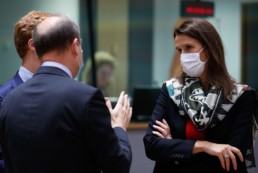Today, Monday 15 November, the Deputy Prime Minister and Minister of Foreign Affairs, Sophie Wilmès, and her fellow ministers met in Brussels for a Foreign Affairs Council meeting. They discussed, among other things, the situation in Belarus, Ethiopia, the Sahel and the Western Balkans, and adopted conclusions expressing the EU’s unequivocal support for the Non-Proliferation Treaty.
Belarus
With regard to Belarus, the Council focused on the precarious humanitarian situation in the border region between Belarus and Poland, where several thousand people are being held in appalling conditions. Belgium has already spoken out strongly against this instrumentalisation of migrants by President Lukashenko’s regime.
Sophie Wilmès: “The way in which the regime is playing with the lives of thousands of people – including young children – for purely political purposes is criminal and totally unacceptable. Belgium is therefore one of those countries which supported very quickly the drafting of a new package of sanctions, aimed among other things at those who facilitate illegal border crossings. For our country, there had to be a political agreement with regard to that new sanctions package as soon as possible, which has now happened.”
Our country also reiterates its solidarity with the affected Member States and the migrants who are the victims. For Belgium, this solidarity must be accompanied by a European commitment in the field via the expertise of Frontex, the European Border and Coastguard Agency. “Border policies should always be in line with international law and asylum law. Humanitarian organisations therefore need urgent access to the border area in order to assist the migrants,” says Sophie Wilmès. Our country also calls for progress on the new EU Pact regarding Asylum and Migration as a structural solution to migration crises.
Ethiopia
The Council also discussed recent developments in Ethiopia, and the report of the OHCHR, the services of the United Nations High Commissioner for Human Rights, and the Ethiopian Human Rights Commission, which describe an “extreme brutality” on the part of all the warring parties, all of whom have committed very serious violations, which – what investigations must now show – may qualify as crimes against humanity or war crimes.
For our country, an unconditional and immediate ceasefire is now the absolute priority. The solution will be political, and the Ethiopian authorities will be part of it. Belgium supports the mediation initiative of the High Representative of the African Union, Obasanjo. Our country also remains very concerned about the de facto blockade on humanitarian aid, which amounts to the possible use of hunger as a weapon of war, and supports the imposition of sanctions.
Sophie Wilmès: “The report of the UN High Commissioner for Human Rights – a long list of atrocities, often directed against civilians – men, women and children – leaves no room for delay. We must now begin to prepare sanctions for those directly responsible for war crimes and crimes against humanity. The EU has established a human rights sanctions regime. Let’s use that too.”
Through its deputy prime minister, our country is also calling for lessons to be learned from the crisis in Afghanistan, and to work together on an emergency plan. Sophie Wilmès: “For our country, it is crucial to prepare for the worst and to work together now on a European contingency plan which guarantees the security of our citizens and diplomatic missions on the ground.” Also during the Afghan crisis, our country repeatedly called for consular crisis management to be better organised at the European level.
Sahel
The Council also discussed the situation in the Sahel, focusing mainly upon developments in the political transition in Mali and reports of a possible cooperation agreement between the Malian transition authorities and the Russian paramilitary group, Wagner. Our country reiterated at the Council the urgent need for civil and political change and structural reform in Mali. Considering the use of mercenaries goes against all our priorities for the region, especially good governance, accountability, respect for human rights, the fight against impunity and the rule of law. “That is why we must intensify dialogue and continue to approach the Malian authorities and neighbouring countries based upon our priorities. The next Sahel coalition summit (in principle before the end of the year) should be the horizon for an update on the use of our political levers. All indications are that the elections originally scheduled for February 2022 will be postponed. The adoption of sanctions must therefore be considered in concrete terms,” said Sophie Wilmès.
Western Balkans
The foreign ministers of the European Union also took stock of the political situation in the Western Balkans. The discussions focused on the need for them to maintain their European commitment and the importance of the reform agenda of these countries. The Council is also concerned about the clear increase in tensions in the region in recent months.
Sophie Wilmès, in her role as President of the Benelux countries: “As regards the dialogue between Belgrade and Pristina, our EU Special Envoy Mr Lajčák has our full support in further defusing tensions between Serbia and Kosovo and in finding sustainable solutions between the two neighbouring countries. As regards Bosnia and Herzegovina, the recent actions of some political leaders are causing further destabilisation. The Benelux countries believe that the EU must communicate very clearly when the country’s sovereignty and territorial integrity are questioned and politicians are divisive.”
Non-Proliferation Treaty
Finally, the Council adopted today conclusions expressing the EU’s unequivocal support for the Non-Proliferation Treaty (NPT). Belgium welcomes this support for the NPT, which confirms it as the cornerstone of the global nuclear non-proliferation regime, the essential basis for the pursuit of nuclear disarmament and an important element in the development of nuclear technology applications for peaceful purposes.
